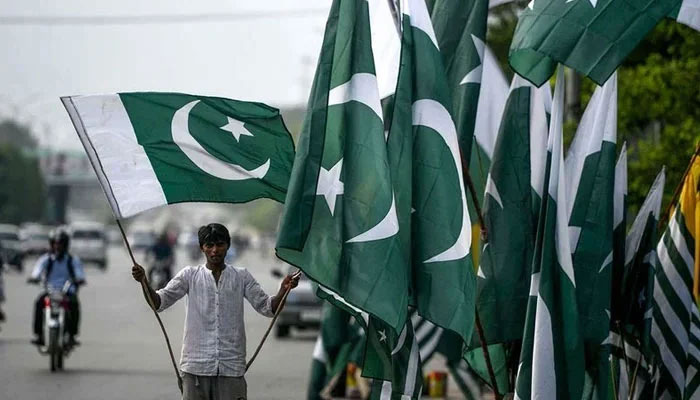The stakeholder dilemma
If ‘ordinary’ civilian knows which way lies power, why do political parties pretend to pander to whatever spin they wish to give their quest for power?
Who really are Pakistan’s political ‘stakeholders’? The more optimistic would say political parties. Those with eternal hope may even venture ‘the people’! But pretty much everyone in the country knows who the absolute real stakeholders are. Which is why coquettishness no longer suits Pakistan’s political parties when it comes to this question. If the ‘ordinary’ civilian knows which way lies power, why do political parties pretend to pander to whatever spin they wish to give their quest for power? It is in this context that former president Dr Arif Alvi’s recent statement – that the PTI will only engage in dialogue with the ‘real’ stakeholders – should be seen. Apart from absolute candidness – which is always refreshing – the fact that our political parties too know where their salvation lies underscores a longstanding problem: their unhealthy obsession to be the charmed one, the ‘blue-eyed boy’, the favoured flavour of the moment – and any number of such euphemisms – rather than earning legitimacy through the democratic process. Every political party’s narrative of collusion and coercion paints a grim picture of the political landscape, where real power dynamics are starkly different from the constitutional framework, a reality that political parties often exploit for short-term gains.
Our politicians have historically sought institutional patronage to gain or maintain power, resulting in a vicious cycle where elected leaders have done precious little to strengthen democratic institutions but have gone beyond the necessary to seek favour from powerful but unelected structures. This dependency undermines the very essence of democracy, where the people, through their elected representatives, should be the ultimate decision-makers. And what are we to do with Dr Alvi’s statement? How does it resonate with the PTI’s rather overzealous supporters who have recently discovered Pakistan’s many political power loopholes and pitfalls? How can they reconcile the rather pragmatic politics of some of the PTI’s more political leaders with the revolutionary messaging being virtue-signaled by the PTI’s social media teams and ardent supporters abroad? When political parties prioritize securing institutional favour over building robust and accountable institutions, the dream of democracy, as well as genuine accountability, remains elusive.
For true accountability and democratic governance, political parties must extricate themselves from the shadows of Pakistan’s power plays. This requires a collective effort to uphold the supremacy of civilian rule and the constitution. Political leaders must work towards creating a political culture where power is derived from the mandate of the people – and nowhere else. The solution lies in a concerted effort by all political stakeholders to adhere to democratic norms and practices, resist the temptation to seek interventions in political affairs, focus on building and empowering democratic institutions, engage in sincere and inclusive political dialogue, and hold themselves accountable to the public and the law. The PTI, along with other political parties, must recognize that their short-sighted – and self-serving – strategies ultimately weaken democratic governance. The real stakeholders in any democracy are the people, and it is to them that political leaders must be accountable. One would think that our political parties will have learnt that by now. One would be wrong.
-
 ChatGPT Caricature Prompts Are Going Viral. Here’s List You Must Try
ChatGPT Caricature Prompts Are Going Viral. Here’s List You Must Try -
 James Pearce Jr. Arrested In Florida After Alleged Domestic Dispute, Falcons Respond
James Pearce Jr. Arrested In Florida After Alleged Domestic Dispute, Falcons Respond -
 Cavaliers Vs Kings: James Harden Shines Late In Cleveland Debut Win
Cavaliers Vs Kings: James Harden Shines Late In Cleveland Debut Win -
 2026 Winter Olympics Snowboarding: Su Yiming Wins Bronze And Completes Medal Set
2026 Winter Olympics Snowboarding: Su Yiming Wins Bronze And Completes Medal Set -
 Trump Hosts Honduran President Nasry Asfura At Mar-a-Lago To Discuss Trade, Security
Trump Hosts Honduran President Nasry Asfura At Mar-a-Lago To Discuss Trade, Security -
 Cuba-Canada Travel Advisory Raises Concerns As Visitor Numbers Decline
Cuba-Canada Travel Advisory Raises Concerns As Visitor Numbers Decline -
 Anthropic Buys 'Super Bowl' Ads To Slam OpenAI’s ChatGPT Ad Strategy
Anthropic Buys 'Super Bowl' Ads To Slam OpenAI’s ChatGPT Ad Strategy -
 Prevent Cancer With These Simple Lifestyle Changes
Prevent Cancer With These Simple Lifestyle Changes -
 Air Canada Flight Diverted St John's With 368 Passengers After Onboard Incident
Air Canada Flight Diverted St John's With 368 Passengers After Onboard Incident -
 Experts Reveal Keto Diet As Key To Treating Depression
Experts Reveal Keto Diet As Key To Treating Depression -
 Inter Miami Vs Barcelona SC Recap As Messi Shines With Goal And Assist
Inter Miami Vs Barcelona SC Recap As Messi Shines With Goal And Assist -
 David Beckham Pays Tribute To Estranged Son Brooklyn Amid Ongoing Family Rift
David Beckham Pays Tribute To Estranged Son Brooklyn Amid Ongoing Family Rift -
 Jailton Almeida Speaks Out After UFC Controversy And Short Notice Fight Booking
Jailton Almeida Speaks Out After UFC Controversy And Short Notice Fight Booking -
 Extreme Cold Warning Issued As Blizzard Hits Southern Ontario Including Toronto
Extreme Cold Warning Issued As Blizzard Hits Southern Ontario Including Toronto -
 Lana Del Rey Announces New Single Co-written With Husband Jeremy Dufrene
Lana Del Rey Announces New Single Co-written With Husband Jeremy Dufrene -
 Ukraine-Russia Talks Heat Up As Zelenskyy Warns Of US Pressure Before Elections
Ukraine-Russia Talks Heat Up As Zelenskyy Warns Of US Pressure Before Elections




